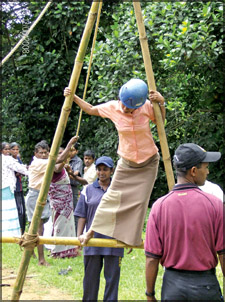Meeting ambitions of young estate workers
The estate community has a new vision - to be treated not as
labourers but as stakeholders in an industry that recognizes and
appreciates the dignity of labour and the professionalism it entails.
With this forward thinking and farsighted approach rejuvenating the
plantation sector, strategies are in progress to attract the children of
estate workers who were once reluctant to follow their parents’
footsteps, to seek the profession of their forefathers once again.
|

A training session for estate workers |
The plantation sector had been, in the recent past experiencing a
problem of an ageing and declining labour force with the younger
generation migrating to white collar jobs and other employment
opportunities. This is in spite of plantations offering even more than
the stipulated number of 300 days a year to the workers.
Only about 60% make use of this lucrative opportunity by coming to
work regularly. The reduced inflow of skilled workers has been impacting
negatively on labour productivity, compounded with frequent
government-influenced wage hikes.
The Regional Plantation Companies that manage the tea plantations
give first preference to competence when engaging the next generation of
estate workers.
This has paved the way for the more ambitious and dedicated
individuals to succeed in gaining entry into higher positions in the
estates.
Over a 1,000 children of estate workers have been appointed to staff
positions since the plantation companies were privatized in 1992, in
addition to some 725 children of staff members across the 20 plantation
companies who have secured similar appointments.
Training workshop
Considerable effort is made by the plantation companies to improve
the skills of plantation workers through in situ training and special
training workshops and this has paid rich dividends, not only by
improving competencies that lead to higher productivity and
efficiencies, but also uplifting the lifestyle of the estate worker
community.
The training is conducted with the assistance of trainers from
external organizations such as Sri Lanka Business Development Centre,
the Productivity Secretariat, the Department of Labour and several
Non-Governmental Organizations such as World University Services of
Canada that offer the required knowledge and skills.
SLBDC’s Outward Bound training programme has already conducted
innovative, semi-adventurous course modules for the estate workers in
more than 17 privatized estates, designed not only to improve the
workers competencies on the field, but also their team-working ability
as well as their own life skills, building self confidence and
self-worth. Subjects covered included nutrition, household cash and
asset management, environmental concerns and land productivity.
Even sensitive topics such as alcoholism were covered. The sessions
had very positive feedback from the participants who were able to look
at their lives from a different perspective. Pusana is a Thalaiver at a
RPC estate and his wife is a plucker.
They have 3 children. Both participated in team building exercises
and were amazed at the end of a 2-day programme. “I feel like a new
person” Pusana said, after readily absorbing concepts such as
participatory management, quality circles, management of change and
gender issues of sharing responsibilities.
A better life style
Apart from training, estate workers of today face a lifestyle that is
quite different to the popular myth that they are under privileged. In
reality, compared to the rest of population, the estate community is
able to enjoy a higher degree of welfare facilities.
The health and nutrition standards available to the average tea
estate worker is far better than that of a rural villager with the
estate worker’s per capita daily energy intake being on par with FAO
recommended standards and the national average for Sri Lanka.
Maternal care is closely monitored to ensure a healthy baby, with
excellent pre-natal and ante-natal care within the estates, regularly
visited by a DMO and government midwife.
Almost all the children are born in institutions and receive
vaccinations against all childhood diseases while lactating mothers get
vitamins and nutrition.
80% of the children receive their education in estate schools.
Housing, clothing, education, transport, fuel, electricity and
recreation costs a family 30% of their income while at a national level,
this is as high as 45%.
Estate workers have easy access to medical care within the estate and
only 6% seek hospital treatment.
In fact, the cash wages paid is the highest in the world’s tea
industry and in addition they get close to 45% more as non-wage benefits
and allowances.
The rate of increase in wages for tea estate workers between 1995 and
2007 was 403% and such a phenomenal increase did not take place anywhere
else in the world.
What is most significant is that when the wage of an estate worker is
increased by Rs. 1, the wage bill alone increases by Rs. 50 million for
the Regional Plantation Companies in addition to statutory benefits such
as EPF, ETF and gratuity.
The ‘womb to tomb’ care the estate community enjoys however is not
always appreciated by the workers. Sri Lanka’s tea plantations are the
only employer in the world that nurtures the well-being not only of its
employee but also his entire family. Only 25% of the total population
living within RPC estates are workers. The rest are dependents.
Even that 25% does not adequately make use of the lucrative
opportunities offered, preferring instead to seek employment outside
while enjoying the welfare available, placing severe pressure on these
facilities.
The actual picture is that far from being overworked, undernourished
and impoverished, the average tea estate worker of today leads a far
better lifestyle than the average rural villager in Sri Lanka.
Now, in order to lure them back into working in the plantations and
help the nation to maintain its competitive edge as the world’s leader
in tea, the plantation management is offering them the dignity and
professionalism that goes hand in hand with a hard day’s honest work on
our undulating tea gardens. |

